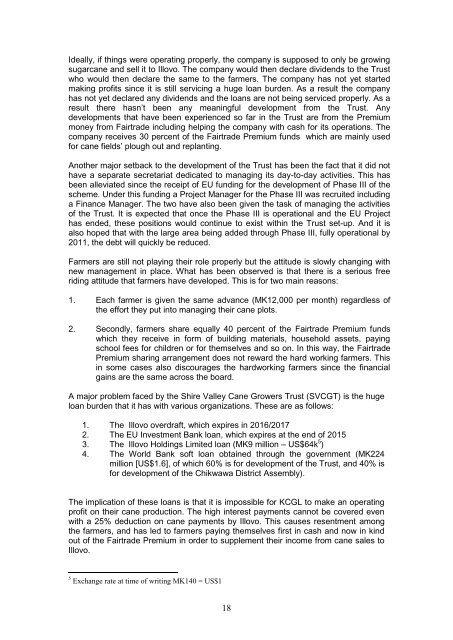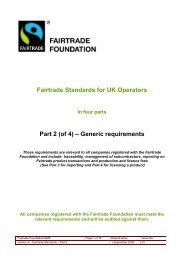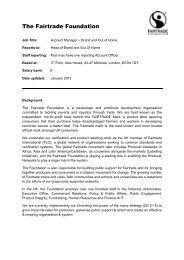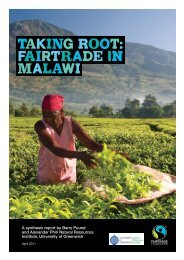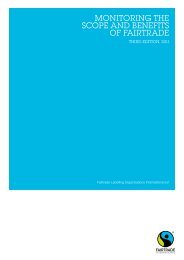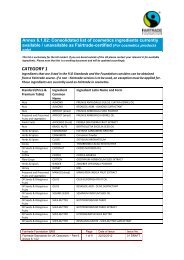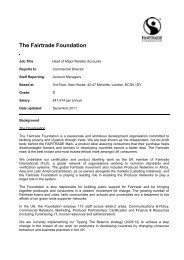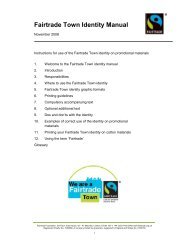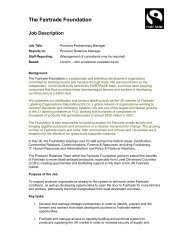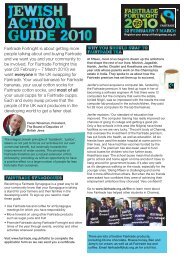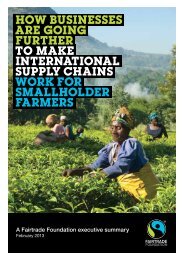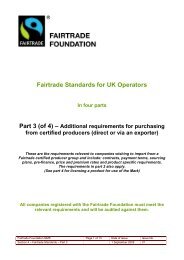longitudinal impact assessment study of sugar producers in malawi
longitudinal impact assessment study of sugar producers in malawi
longitudinal impact assessment study of sugar producers in malawi
Create successful ePaper yourself
Turn your PDF publications into a flip-book with our unique Google optimized e-Paper software.
Ideally, if th<strong>in</strong>gs were operat<strong>in</strong>g properly, the company is supposed to only be grow<strong>in</strong>g<br />
<strong>sugar</strong>cane and sell it to Illovo. The company would then declare dividends to the Trust<br />
who would then declare the same to the farmers. The company has not yet started<br />
mak<strong>in</strong>g pr<strong>of</strong>its s<strong>in</strong>ce it is still servic<strong>in</strong>g a huge loan burden. As a result the company<br />
has not yet declared any dividends and the loans are not be<strong>in</strong>g serviced properly. As a<br />
result there hasn’t been any mean<strong>in</strong>gful development from the Trust. Any<br />
developments that have been experienced so far <strong>in</strong> the Trust are from the Premium<br />
money from Fairtrade <strong>in</strong>clud<strong>in</strong>g help<strong>in</strong>g the company with cash for its operations. The<br />
company receives 30 percent <strong>of</strong> the Fairtrade Premium funds which are ma<strong>in</strong>ly used<br />
for cane fields’ plough out and replant<strong>in</strong>g.<br />
Another major setback to the development <strong>of</strong> the Trust has been the fact that it did not<br />
have a separate secretariat dedicated to manag<strong>in</strong>g its day-to-day activities. This has<br />
been alleviated s<strong>in</strong>ce the receipt <strong>of</strong> EU fund<strong>in</strong>g for the development <strong>of</strong> Phase III <strong>of</strong> the<br />
scheme. Under this fund<strong>in</strong>g a Project Manager for the Phase III was recruited <strong>in</strong>clud<strong>in</strong>g<br />
a F<strong>in</strong>ance Manager. The two have also been given the task <strong>of</strong> manag<strong>in</strong>g the activities<br />
<strong>of</strong> the Trust. It is expected that once the Phase III is operational and the EU Project<br />
has ended, these positions would cont<strong>in</strong>ue to exist with<strong>in</strong> the Trust set-up. And it is<br />
also hoped that with the large area be<strong>in</strong>g added through Phase III, fully operational by<br />
2011, the debt will quickly be reduced.<br />
Farmers are still not play<strong>in</strong>g their role properly but the attitude is slowly chang<strong>in</strong>g with<br />
new management <strong>in</strong> place. What has been observed is that there is a serious free<br />
rid<strong>in</strong>g attitude that farmers have developed. This is for two ma<strong>in</strong> reasons:<br />
1. Each farmer is given the same advance (MK12,000 per month) regardless <strong>of</strong><br />
the effort they put <strong>in</strong>to manag<strong>in</strong>g their cane plots.<br />
2. Secondly, farmers share equally 40 percent <strong>of</strong> the Fairtrade Premium funds<br />
which they receive <strong>in</strong> form <strong>of</strong> build<strong>in</strong>g materials, household assets, pay<strong>in</strong>g<br />
school fees for children or for themselves and so on. In this way, the Fairtrade<br />
Premium shar<strong>in</strong>g arrangement does not reward the hard work<strong>in</strong>g farmers. This<br />
<strong>in</strong> some cases also discourages the hardwork<strong>in</strong>g farmers s<strong>in</strong>ce the f<strong>in</strong>ancial<br />
ga<strong>in</strong>s are the same across the board.<br />
A major problem faced by the Shire Valley Cane Growers Trust (SVCGT) is the huge<br />
loan burden that it has with various organizations. These are as follows:<br />
1. The Illovo overdraft, which expires <strong>in</strong> 2016/2017<br />
2. The EU Investment Bank loan, which expires at the end <strong>of</strong> 2015<br />
3. The Illovo Hold<strong>in</strong>gs Limited loan (MK9 million – US$64k 5 )<br />
4. The World Bank s<strong>of</strong>t loan obta<strong>in</strong>ed through the government (MK224<br />
million [US$1.6], <strong>of</strong> which 60% is for development <strong>of</strong> the Trust, and 40% is<br />
for development <strong>of</strong> the Chikwawa District Assembly).<br />
The implication <strong>of</strong> these loans is that it is impossible for KCGL to make an operat<strong>in</strong>g<br />
pr<strong>of</strong>it on their cane production. The high <strong>in</strong>terest payments cannot be covered even<br />
with a 25% deduction on cane payments by Illovo. This causes resentment among<br />
the farmers, and has led to farmers pay<strong>in</strong>g themselves first <strong>in</strong> cash and now <strong>in</strong> k<strong>in</strong>d<br />
out <strong>of</strong> the Fairtrade Premium <strong>in</strong> order to supplement their <strong>in</strong>come from cane sales to<br />
Illovo.<br />
5 Exchange rate at time <strong>of</strong> writ<strong>in</strong>g MK140 = US$1<br />
18


